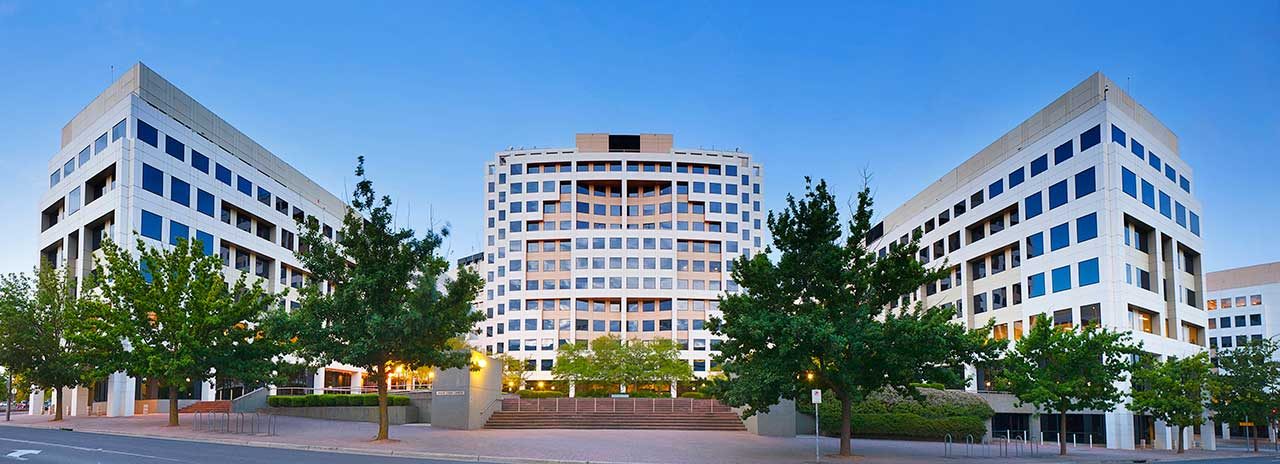This article is from the Australian Property Journal archive
AUSTRALIA’S largest landlord, Dexus, has sold off the three-building Finlay Crisp Centre office complex in Canberra for $62 million, three years after putting it to the market.
The announcement comes as the group reaffirmed its guidance of 5% distribution per share growth for the full year, as part of its quarterly update following its $800 million acquisition of the remaining share in Sydney’s MLC Centre, and of the 80 Collins Street commercial complex in Melbourne’s east end from QIC, in a deal shaping up to exceed $1.3 billion.
Dexus has also conditionally exchanged contracts to sell 11 Talavera Road in Macquarie Park for $231.2 million, and said it had exchanged contracts to sell the Finlay Crisp Centre at 1 Constitution Avenue in April.
The Finlay Crisp Centre was listed for sale in 2016 with expectations of as much as $85 million, but had a most recent book value of $31.5 million and a short weighted average lease expiry of 1.6 years, with tenants including the federal and ACT governments.
It occupies an entire city block of 8,844 sqm and comprises three adjacent office buildings in Customs House, Allara House and Nara Centre, with a total combined net lettable area of 29,982 sqm.
Meanwhile, Dexus has secured engineering company Worley for 10,706 sqm at 240 St Georges Terrace in Perth, bringing the office tower to 92.5% occupancy, and is also close to filling 100 Mount Street in North Sydney ahead of completion.
Worley joins Macquarie Bank, Iluka Resources, Wood, HWL Ebsworth, BP and Nous Group as new tenants to have signed up for a combined 43,000 sqm-plus within 240 St Georges Terrace over the past 12 months, as improving conditions in the state’s economy flow through to office leasing activity.
Worley will consolidate its existing Perth offices and house the recently acquired Jacobs ECR business at its new digs.
Dexus head of office leasing, Chris Hynes said that as the redevelopment works at the building progress, “we continue to capitalise on the steady recovery of the Perth office market, with increased optimism from the broader business community seeking to invest in their workplace to attract and retain talent”.
Dexus has recently taken the entire Kings Square office complex in the Perth CBD to full occupancy, after St John of God Health Care signed up for 5,232 sqm at the KS1 component. Tenants in the complex also include P&N Bank, BG&E and the Commonwealth Government.
The $600 million 100 Mount Street tower in North Sydney is on track for completion this month and is similarly 92% leased.
Over the quarter, Dexus leased 41,874 sqm of office space and 19,225 sqm of office development space across 93 transactions, with office portfolio occupancy increasing to 97.5%.
In its Australian Real Estate Quarterly Review, Dexus general manager research Peter Studley said the office market outlook hinges on the outlook for occupier demand.
“Employment growth remains positive, however in FY20 conditions are expected to ease due to slowing business confidence and an uncertain economic outlook which means occupier demand is likely to ease.
“Should this occur, Australia’s main office markets are well-positioned given a degree of pent-up demand, low or falling vacancy rates and a lack of short term supply. In addition, an increase in the supply pipeline over the next few years is supported by solid levels of pre-commitment,” Studley said.
Across its industrial portfolio, Dexus leased 46,193 sqm of industrial space across 19 transactions through the quarter, taking its industrial portfolio occupancy to 96.9%.
“After a period of relative buoyancy, weaker consumer and business indicators point to the prospect of slower demand in FY20. However, there has been little sign of a moderation in take-up to date.
“Assuming consumption growth does slow across the economy, the industrial sector won’t be immune, but it will be insulated to a degree by the ongoing structural tailwinds of infrastructure projects and supply chain investment particularly in the ecommerce sector.
Dexus said the supply chain investment and consolidation trend favours investment in new well-located stock.
“Stock obsolescence will become increasingly prevalent as customers require more advanced building technology to facilitate the efficiency of their logistics operation,” Studley said. “The greatest challenge for investors going forward will be gaining scale within the sector given strong competition for stock.”
Australian Property Journal




